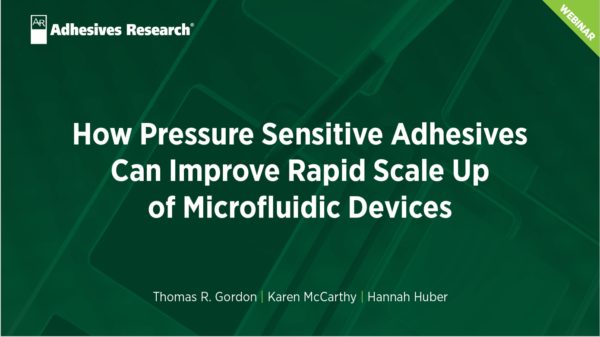Microfluidic devices provide an important platform for medical diagnostic devices, allowing for the analysis of biochemical/biological species from ever decreasing volumes of fluid. Devices have been produced to quantify medically relevant compounds (e.g. blood glucose), to detect biomarkers of cancer (e.g. Prostate Specific Antigen), to sequence entire genomes, as well as to grow and experiment on organ cells in “organ-on-a-chip” devices. Many early prototypes of microfluidic devices are produced using soft lithography, a method which allows for the replication of molds produced with traditional lithographic techniques using polydimethylsiloxane (PDMS). Researchers have developed alternative techniques using pressure sensitive adhesive (PSA) tapes which allow for the rapid assembly of microfluidic devices in a process which can be easily scaled to large volume production. PSA tapes also allow for the bonding of dissimilar materials, enabling production of unique product designs. However, the choice of PSA tape is important, as there are critical aspects regarding the choice of components and production process which impact the performance of a microfluidic device. With the correct choice of tape, this method allows researchers to rapidly produce functional prototypes which can then be efficiently scaled to large volumes. Adhesives research has over 25 years of experience in developing PSA tapes for microfluidics and our PSA tapes allow for the rapid assembly of devices and easy to scale up. Join our Innovation team leader Thomas Gordon for a webinar “How Pressure Sensitive Adhesives can Improve Rapid Scale up of Microfluidics Devices” on March 4th 2.00-2.45pm and learn more about how our hydrophilic adhesives, spacer tapes and cover tape adhesives can enhance the functionality of your microfluidics and diagnostic devices.
For USA: March 4th 2.00 pm – 2:40 pm EST and register today https://lnkd.in/e5wudfj
For EU+UK: March 4th 2.00 pm – 2:40 pm GMT and register today: https://lnkd.in/eEFxdnU


